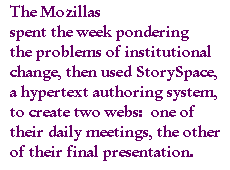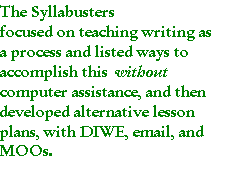
At the Richmond Institute, the forty participants broke out into teams to prepare a series of group presentations for the end of the week. The teams worked either on redesigning a traditional syllabus for use in technology-rich environments or on strategies for introducing institutional change. The Richmond leaders have posted photographs of these groups at the Institute web site.
| CommonDIWES | Mozillas | Slow Starters | Syllabusters | Transformers |
![]()
The groups tackled issues surrounding technological change on college and university campuses, worked to redesign individual syllabi, and built collaborative bridges for the duration of the Epiphany Project. Interestingly, none of the groups offered prescriptive or normative formulas for rewriting syllabi or training faculty.
For many participants, one of the most valuable parts of the workshop was observing mainstream faculty interacting with new technologies in an intensive, focused environment for a full week. Observing highly experienced teachers learning about email, hypertext and the Internet, online discussion, networked file-sharing, and collaborative electronic pedagogies gave us insight into the needs other faculty may have as they either encounter computers for the first time or attempt to use them more fully with their teaching and scholarly practices. Each workshop gave constant reminders that computer-and-composition workshops are still faculty development workshops and that technology-trainers should keep magical thinking about computers to a minimum by concentrating on teaching first, technology second . All of this is reminiscent of the early adopter-to-mainstream continuum that Steve Gilbert wrote about in the oft-cited March/April 1996 issue of Change Magazine , published by the American Association of Higher Education. Gilbert is a co-principal investigator for the Epiphany Project; his Teaching, Learning and Technology (TLT) Roundtables are a sister project.
 CommonDIWES
CommonDIWES
Since the institute introduced collaborative writing software, including the Daedalus Integrated Writing
Environment , the
Common DIWEs worked on ways to redesign their syllabi to take advantage of the conferencing
power of DIWE. For their final presentation, members demonstrated an Interchange session, with
several group members participating from a remote lab in a discussion of ways in which
real-time electronic discussions will enliven their classrooms this fall.

Finding that answers to each of these may imply changes to previous answers and thus prompt recursiveness, the group designed a planning "wheel" to aid in building effective partnerships.
| Formats | Themes | Leaders | People |
Send comments on these pages to: Claudine Keenan
![]()